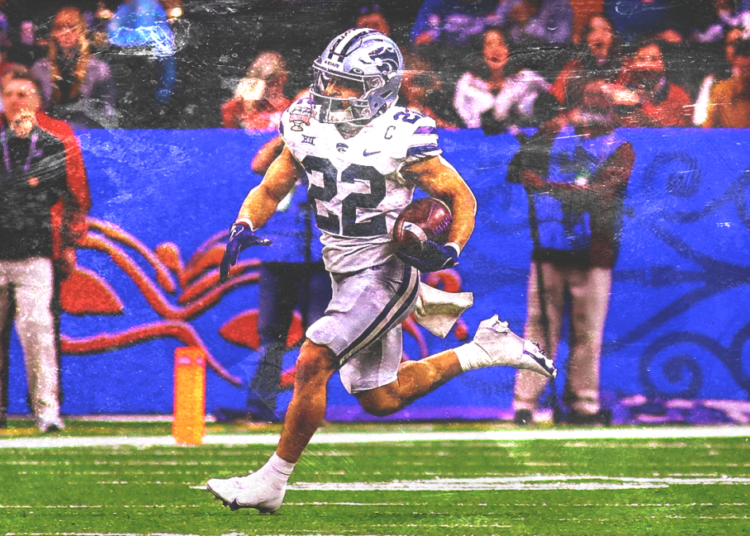MANHATTAN, Kan. — Nearly three years ago, Chapman McKown sat down to write his hero. Not an email, not a DM, not a text.
“A real letter,” Deuce Vaughn recalled.
I look up to you, the letter began, a statement both inspirational and ironic.
Vaughn at the time was Kansas State’s 5-foot-5, 180-pound Swiss Army knife running back who had just accounted for 164 total yards and a touchdown in his second career game against Oklahoma in 2020.
McKown, just entering Norman North High School in Oklahoma, was watching. He needed some inspiration.
One day, I’m going to be at your position, his letter continued.
That wasn’t a boast. In fact, it remains to be seen whether he will reach his aspirations. Still, the two are linked for obvious reasons.
The pair literally look up to a lot of things. McKown himself is undersized at 5-foot-8, 165 pounds; he’s just beginning his career as an early entry preferred walk-on for the Sooners. Vaughn, a two-time All-American, continues to train ahead of next week’s NFL Draft.
What’s ahead is obvious, though Vaughn has not forgotten what he left behind.
“I got on the phone with him while I was training a couple of months ago,” Vaughn said of McKown. “Man, it is so cool. I still have his letter.”
It’s trite to assuming their ceilings are limited due to their size. That’s not the case, especially in their minds.
Football — both college and pro — has met them at this moment. Former FAU RB Devin Singletary (5-foot-7, 200 pounds) has led the Buffalo Bills in rushing across each of the last four season. He is now with the Houston Texans.
The Kansas City Chiefs won the latest Super Bowl with the help of Jerick McKinnon (5-foot-9, 200 pounds), a seven-year veteran. Barry Sanders (5-foot-9, 200 pounds) is one of the greatest running backs in NFL history having flashed some of the most electric plays ever seen on a gridiron.
Nobody is making that comparison, but Vaughn is different. So different that, at 5-foot-5, he is the shortest player ever measured at the NFL Combine since data began being tracked in 2003.
His draft projections vary.
“He could go at No. 30; he could go at No. 7,” Kansas State RB coach Brian Anderson said.
Most likely, Vaughn will be a Day 2 or Day 3 pick, if that. Pro Football Focus had him as their highest-graded running back on the field in both 2020 and 2021. CBS Sports has Vaughn ranked as the No. 317 overall prospect.
Do not be distracted by these predictions. This story goes beyond draft rooms. It reverberates from this charming hamlet. It goes into television network board rooms. Media rights sources let it be known that the likes of Kansas State being nationally relevant was key to the Big 12 getting a new, richer TV deal despite the conference losing Texas and Oklahoma.
K-State winning its first outright Big 12 title in 19 years is part of that story. It doesn’t happen without Vaughn becoming the soul of a program that has always been developmental.
Look no further than last month when 5-foot-7 guard Markquis Nowell led Jerome Tang’s Wildcats to the Elite Eight. Notice an undersized underdog trend here?
“We, K-State, had to become part of the ‘haves’ quickly,” Wildcats coach Chris Klieman said. “When Oklahoma and Texas left, we challenged each other as a staff. We challenged each other as a program. We challenged each other as players. We need to be relevant right now.”
Vaughn fit right in with that developmental tradition as a three-star prospect out of Round Rock, Texas, in 2020. Anderson is credited with “discovering” Vaughn. “BA” had known Vaughn’s dad, Chris, for two decades. In his down time as an assistant coach at Coffeyville Community College in Kansas, Anderson would drive the 2 ½ hours to Fayetteville, Arkansas, where Chris was a Razorbacks’ assistant.
Through the years, Anderson would watch Deuce would grow up in college locker rooms through his dad’s jobs: Arkansas, Ole Miss, Tulsa, Texas.
“I got to see it up close and personal,” Deuce Vaughn said.
When the time came, Anderson brought Vaughn’s film to Klieman.
“In the last three years, you tell me another running back who has been more productive,” Anderson said. “… I’ve never seen the dude have a bad day. He’s mad when he can’t practice, even [if] he’s sick. Literally, I’ve never seen him get pissed at anyone.”
The NFL is listening. The teams know his story. When he got to campus, Vaughn danced. Not in public and not to music but to his playbook. In his room, repping footwork.
That anecdote starts with Anderson remembering the first time the undersized freshman entered the running back meeting room.
“He walks in the room the first day, notebook open, page after page of notes,” Anderson recalled. “Fast forward, he gets here. He’s in his dorm room by himself at nighttime going through his footwork in the run game — in the mirror by himself.”
In front of a mirror? How did BA know?
“He told me,” the coach said of Vaughn.
That notebook? It had been meticulously curated by Vaughn. He already had access to Kansas State film through Vaughn’s dad, who now is a Dallas Cowboys scout.
“You can always tell yourself what [play] it is,” Vaughn said. “You can talk about it. But there’s nothing more than doing it right there in front of yourself. … You’ve done it so many times so that when you’re with the quarterback and you’re meshing it, you’re saying, ‘I’ve done this thing 500 times.'”
The Swiss Army Knife label might as well be renamed the Vaughn Index. He does so many things so well at a small size that he is rewriting the book on playing closer to the ground. Traditional tailback, slot receiver, pass pro blocking skills that won’t hurt him at the next level. There are also seven career kick returns.
Even with the Flint Hills wind gusting during pro day last month, Vaughn made sure he caught punts in front of scouts during the pro day at Bill Snyder Family Stadium.
“It’s the easiest and fastest way to get on the field [in the NFL],” Vaughn said of special teams. “The past three months, I’ve been catching punts every day I can.”
Little, though, has been easy for the kid who was nicknamed “Deuce” by his mother. A mere “Junior” label just didn’t seem to fit. It made him stand out in a different way before he stood out as a player. Vaughn stopped growing in the ninth grade, resigned to stature and how he could maximize it.
Vaughn called his size his “superpower.”
“I always knew he was fearless and not afraid to run inside,” Klieman said. “We started to use him as a pure running back as the [first] season went on. I’ve been saying ever since he got here: He’s a very underrated running back between the tackles. Some of his best players have 3-4 yard gains that could have been 5-6 yard losses. You can’t get clean shots at him.”
“His ability to catch passes and route running was uncanny,” said K-State offensive coordinator Collin Klein. “He absorbs the football [as a pass catcher]. He’ll adjust to the ball. He attacks the football so well when it’s in the air. It covers for errors that you or I wouldn’t know.”
All of it has formed that legacy that will endure because a lot of this has happened before at Kansas State. You could draw a direct line from K-State legend Darren Sproles to Vaughn. At 5-foot-6, 190 pounds, Sproles played 15 years in the NFL. That was after rushing for almost 5,000 yards in four seasons at K-State.
In 2021, Vaughn became the first Kansas State player voted onto the AP All-America first team in 15 years (as an all-purpose player). That year, he was the Big 12 Offensive Player of the Year. AP named him a first-teamer again in 2022.
He leaves school after three seasons getting to at least 3,600 career yards rushing and 1,250 career yards receiving in the fewest games (37) of any player since 1996.
“I had a feeling halfway through the season with the production he was having [that] this was going to be his last year,” Klieman said, “because it’s not like you’re going to say he’s going to gain 20 pounds and 3 more inches. He had done what he needed to do in life and at the college level.”
“I knew [he could play] from his tape,” said Klein, a 2012 Heisman Trophy finalist. “I don’t know how someone is going to grow and develop. I understand how gritty they are. He exceeded every expectation.”
In the end, it was back on the phone. McKown had been encouraged. It’s time for Vaughn to be reassured. Yes, NFL observers have told him, you can play in this league.
“Running backs coaches, special teams coaches telling me, ‘You’re not too small,'” Vaughn recalled. “‘I wouldn’t be on the phone with you if you were too small.'”
Read the full article here


























